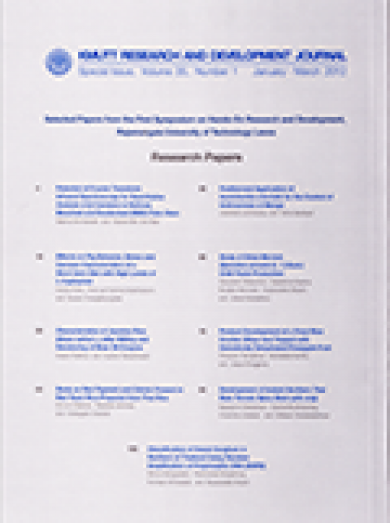Abstract
The aims of this research are to study chemical composition of edible canna starch (Thai-purple variety) and effects of gelatinization temperature (80, 100 and 121°C) and time (5, 20 and 60 min) on properties of edible canna starch films formed by solvent casting technique. Amylose and phosphorus contents of Thai-purple canna starch were 27.93% and 454 ppm, respectively, whereas ash, protein and lipid contents were negligible. An increase in the gelatinization temperature resulted in a considerable change in swelling and disintegration of starch granules. However, the swelling was not significantly different when the gelatinization time was extended. Films of edible canna starch were smooth and translucent and a few cracks at the edges were found. Thickness of the films was in the range of 35 to 46 μm. Gelatinization at 121°C for 20 min under pressure gave the smoothest film with a B-type crystalline structure. Tensile strength of the films gelatinized at 80°C increased when the time of gelatinization increased (from 43.50 to 50.93 MPa), but those at 100°C were not different (about 50 MPa). On the other hand, elongation and oxygen permeability decreased from 8.90 to 5.92% and 0.294 to 0.021 cm3•μm /m2•d•kPa, respectively, when gelatinization temperature and time increased. Water vapor permeability tended to decrease when the gelatinization temperature increased. Solubility of the films in water was in the range of 0.66 to 1.15%.
Keywords
Edible canna starch; Starch film; Gelatinization; Film properties





